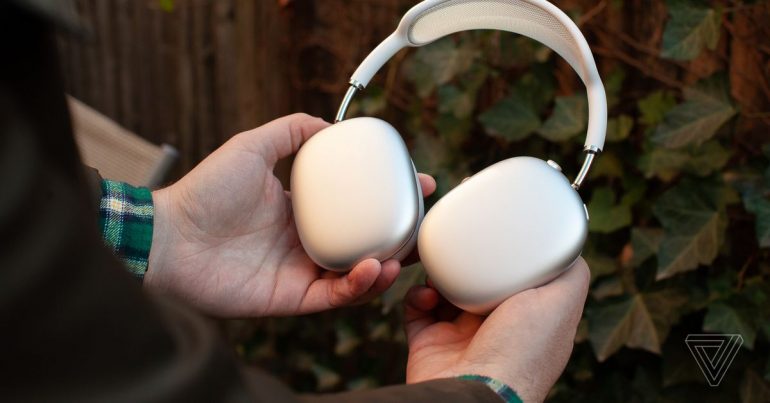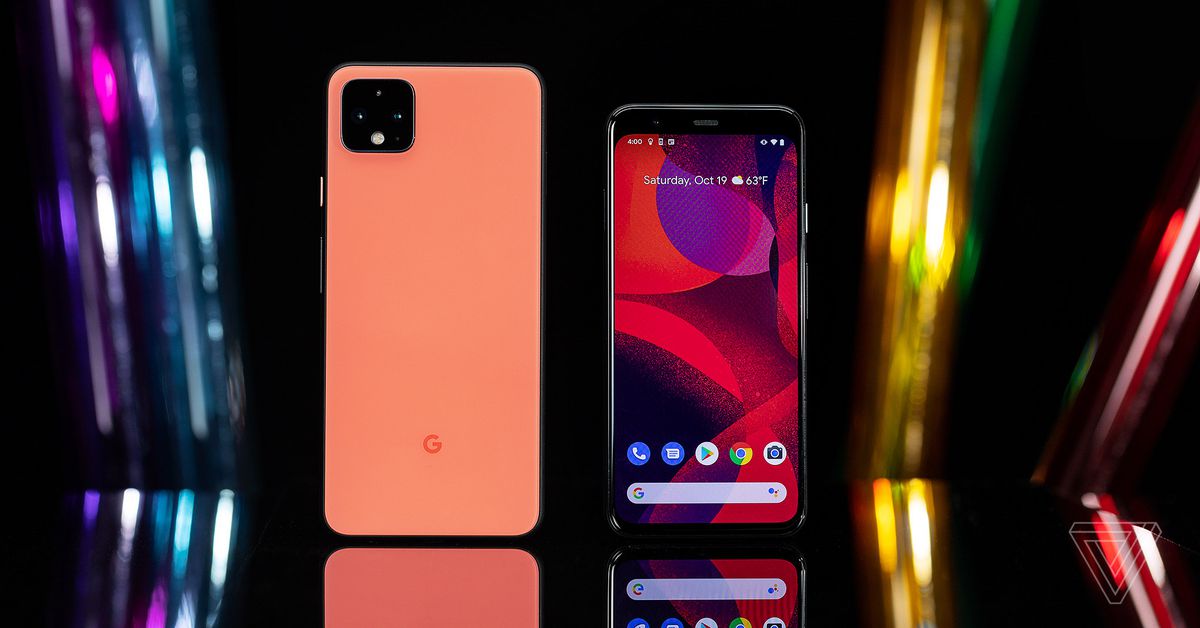After a long lead-up of rumors, Apple managed to squeeze in the AirPods Max just under the wire as its last big hardware release of 2020. It wasn’t surprising to see the company launch its own over-ear, noise-canceling headphones after the meteoric rise and popularity of AirPods, which have come to define the category of true wireless earbuds; nobody really managed to crack it before Apple. The AirPods Max are entering a very different space, where many other companies have excellent options available.
There have been a lot of initial reactions to the AirPods Max, but the one that’s dominated them all is sticker shock: the $549 price is hundreds more than what established competitors like Bose and Sony are charging for their quite excellent noise-canceling headphones. And that’s the crux of the challenge Apple faces: unlike with AirPods, it’s late to this game, and there’s a lot to prove if consumers are going to be sold on spending so much more.
The price tag of the AirPods Max sits far above mainstream noise-canceling headphones, but there are many headphones that go for the same amount and beyond — wireless ones, too. I don’t think it makes sense to compare these against thousand-dollar (and wired) open-back headphones you’d plug into a DAC for listening sessions with a hi-fi music collection; fundamentally, these are Bluetooth headphones aimed at a large consumer audience.
Even so, Apple has tried to match that upper echelon of boutique headphones in terms of build quality and craftsmanship: the AirPods Max have a design heavy on aluminum, steel, and fabric that’s the polar opposite of something like Sony’s plastic-everywhere WH-1000XM4 headphones. There’s nothing wrong with plastic; those Sony cans have taken a beating in my bag and still work great. But everything about the AirPods Max exudes precision — even their unibody metal ear cups, bland as they might seem. (The widely ridiculed carrying “case” is antithetical to this whole notion, but I’ll get to that later.)
This isn’t a review where I’m going to say that the AirPods Max are the best headphones for most people. They are not. If all you want is a good, reliable set of noise-canceling headphones for commuting, travel, or working from home, save your money and stick with something like the Sony 1000XM4s, Bose Noise Cancelling Headphones 700, or the Microsoft Surface Headphones 2, all of which cost at least $200 less. You’ll be well served by any of them.
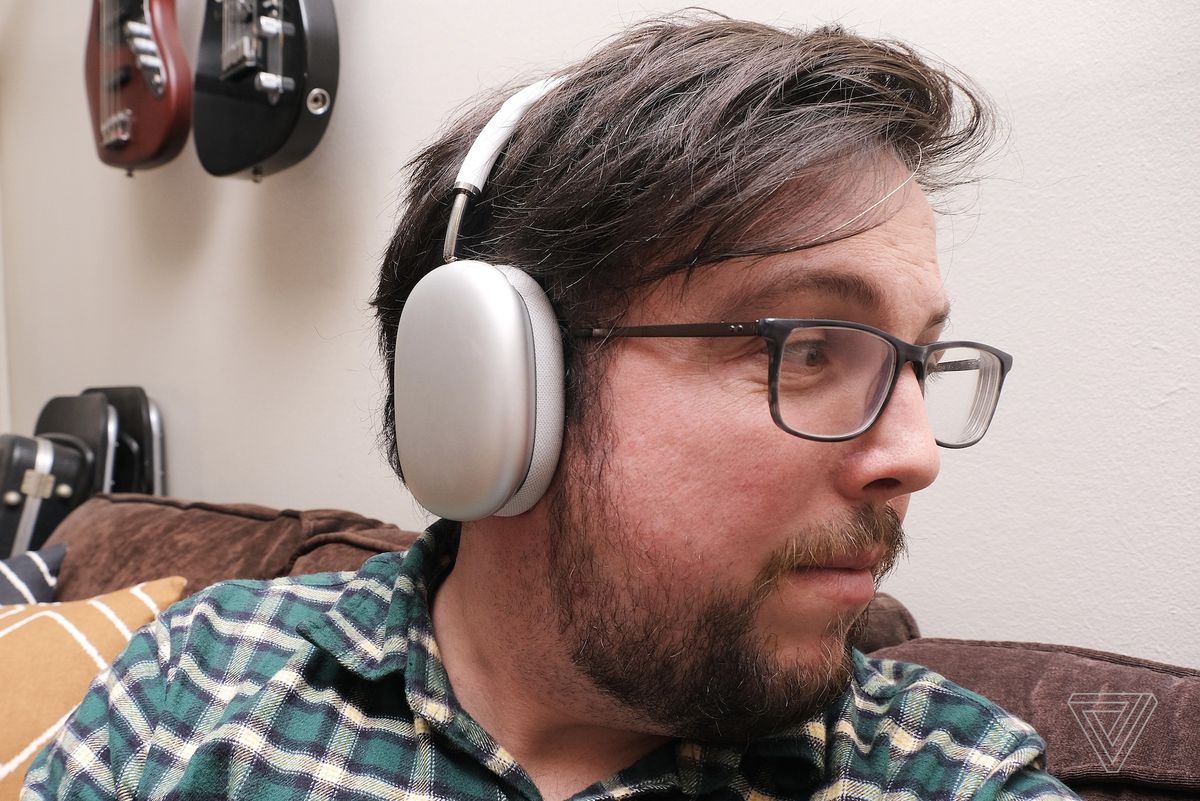
That said, the AirPods Max will make sense for certain people who can immediately find a reason they’re “worth it.” The comfort and feel are top notch, they sound wonderful, the noise cancellation is up there with the very best, and they offer unique features like spatial audio that you really can’t get elsewhere. At least, not quite like this. So it’s worth breaking down some reasons why the AirPods Max could be worth buying if you’ve got the disposable cash.
Fit and finish top the list of pros. The AirPods Max have a stainless steel headband that’s wrapped in a soft polyurethane material. A knit mesh canopy does a good job of keeping the substantial weight of these headphones from putting irritating pressure on the top of your head. The rotating, pivoting aluminum ear cups are attached by telescoping steel stems that take some effort to extend but always stay in place at whatever length you leave them. (The headphones can’t fold up for more efficient storage, unfortunately.)
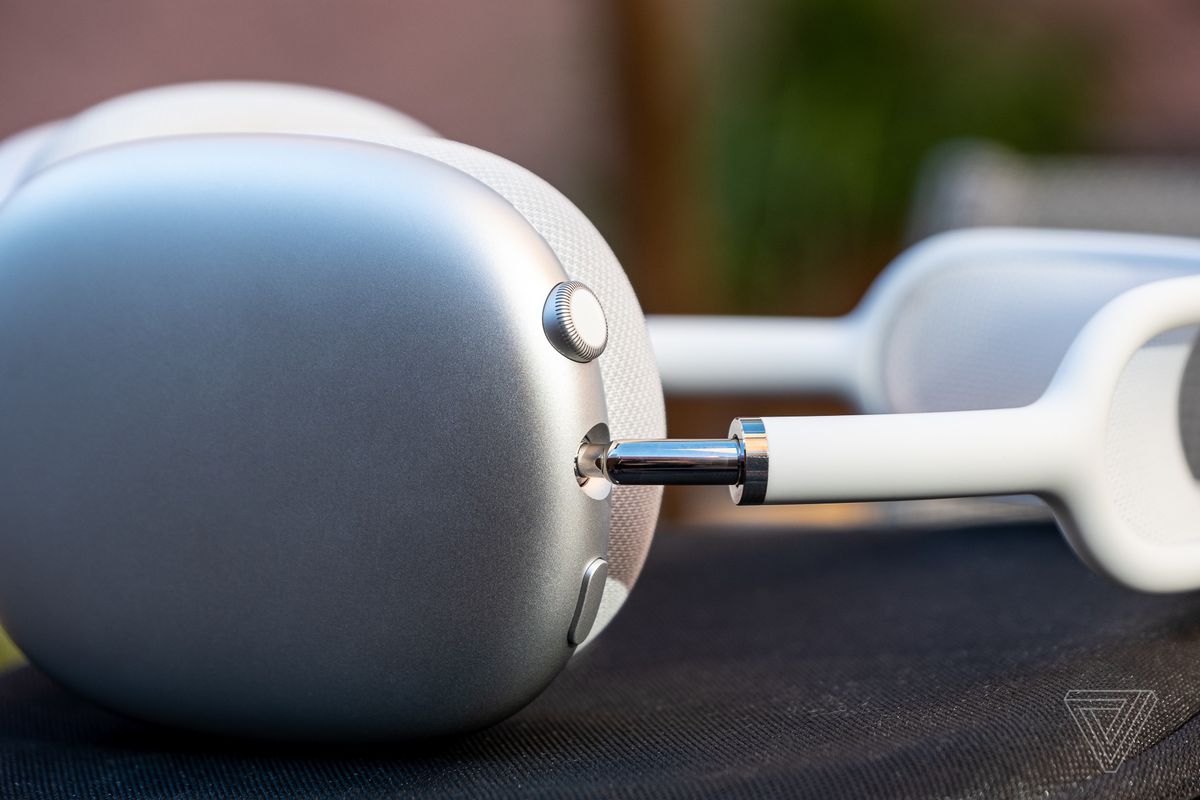
The ear cushions are made from acoustic memory foam with a breathable mesh layer on top. Hopefully, that’ll make for less sweaty ears in warmer months. They attach magnetically, are easy to take off, and popping them back into place is immensely satisfying. The ear cushions are large and oval-shaped, so they won’t uncomfortably press against your ears like some circular ear pads can. Replacement sets (and other colors) are available for $69 a pair.
I’d recommend steering clear of the silver or other lighter colors; the white ear cushions on my review unit are already starting to look a bit dirty after just a few days of wearing them. Going for space gray or the blue color would be my recommendation. The trade-off of Apple’s high-style design is that these materials won’t stay pristine; the company provides basic cleaning instructions, and the ear cushions are easy enough to pop off and wipe down, but I’m not sure what you’re supposed to do if, say, the headband fabric gets mucked up.
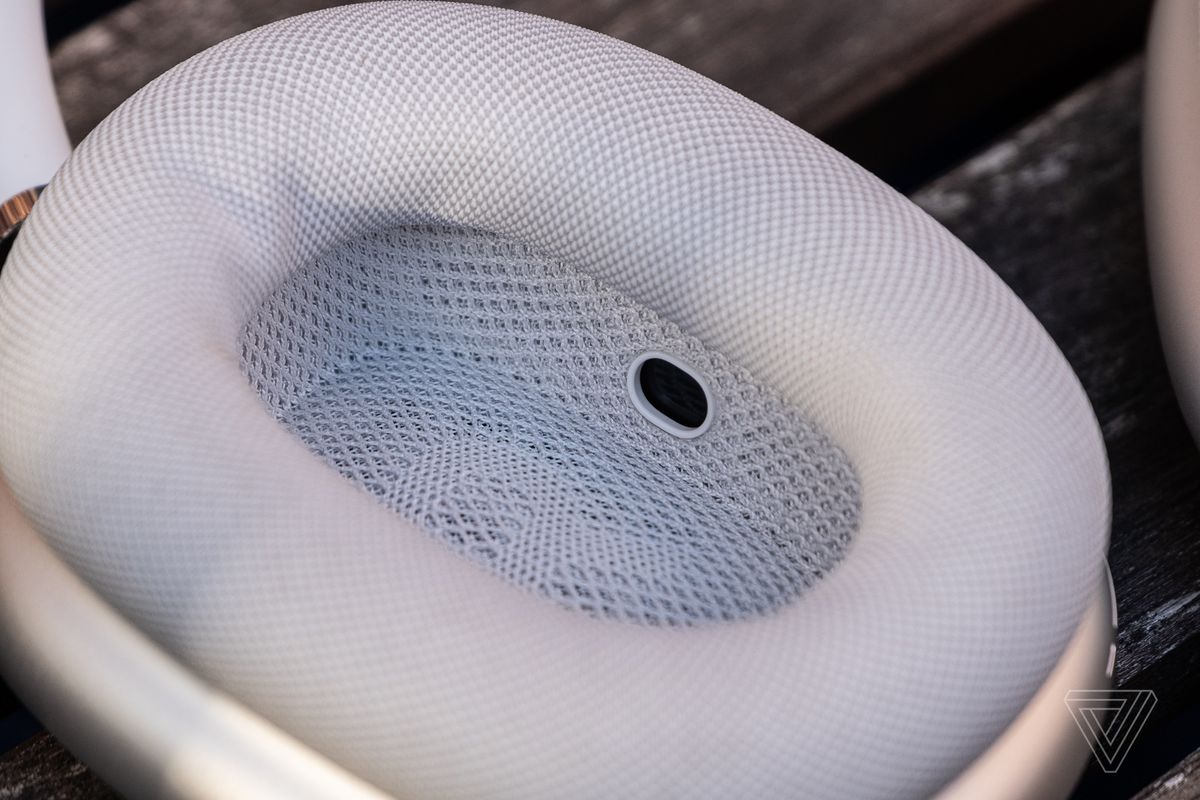
Look around the AirPods Max and you’ll find just two buttons: there’s the Digital Crown — a much larger version than the dial on the Apple Watch — and a button that switches between noise canceling and transparency modes. I’ve really come to like the crown for controlling volume and playback; you don’t get the false inputs or missed swipes that can happen with touch gestures. It’s also easier to use with gloves in cold weather. You press it once to play / pause, twice to skip tracks, or three times to go back; holding it down will activate Siri. Sometimes my fingers will hit the steel stem when feeling for it since they’re close together, but that’s a minor gripe that muscle memory should overcome.
You’ll notice I said nothing about a power button, and that’s because the AirPods Max lack one. They power on when placed on your head, and automatically pause music if removed (or if you lift one ear cup). Take them off fully, and they’ll go into a sleep mode when left on a table or around your neck for a few minutes. When slid into their case, the headphones enter a deeper ultra-low-power mode. I’ve left the AirPods Max out overnight several times without the case and they’ve barely lost any of their charge, so you don’t need to worry about battery drain. This design quirk has been deemed “very Apple” by some, but I wish they’d just stuck a power button somewhere for simplicity’s sake.
There are a lot of cutouts for microphones and sensors around the AirPods Max — there are nine microphones in all, with eight of them used for noise cancellation — and behind those ear cushions are powerful, custom-designed 40-millimeter drivers. Apple says the “dual-neodymium ring magnet motor” backing each driver is inspired by floor-standing speakers and is the reason you won’t hear any distortion even when the Max headphones are cranked to peak volume.
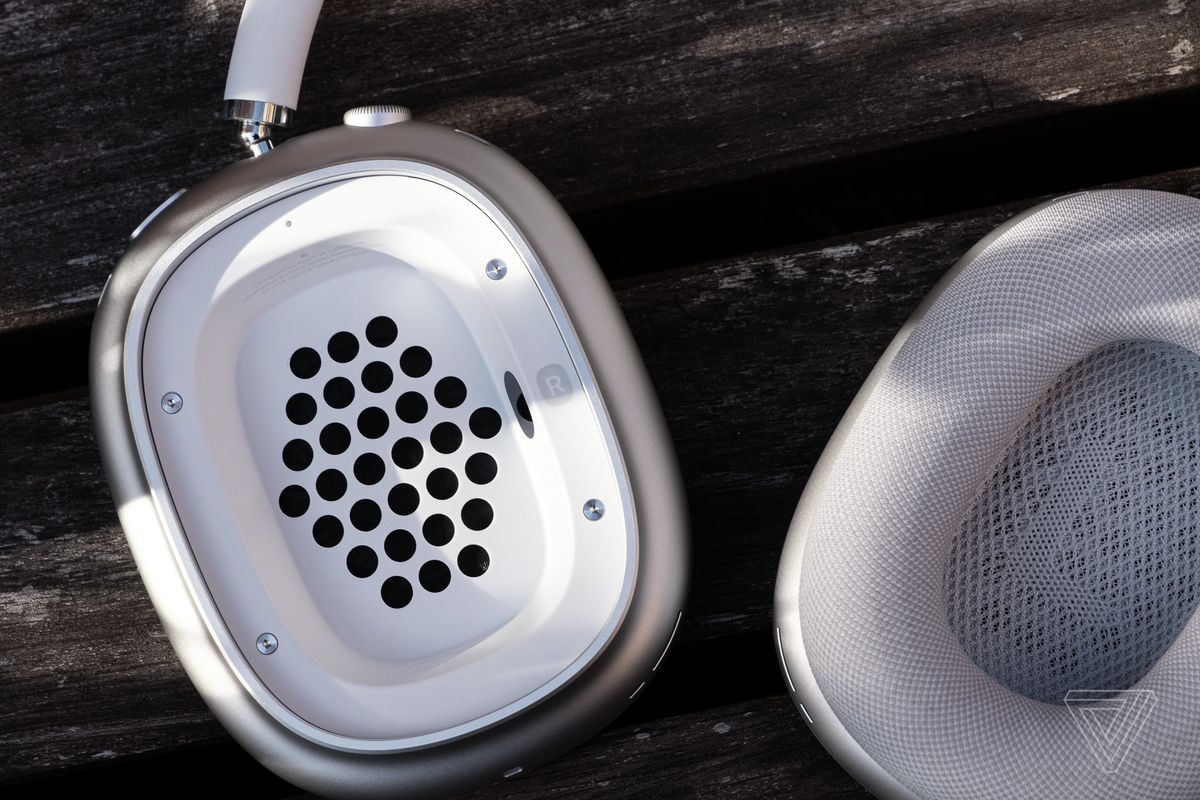
On that note, the second pro for the AirPods Max is sound quality. These headphones make for delightful listening. Apple has struck a great balance between the highs, mids, and lows, and there’s a broader soundstage with these than you’d get from the Sony or the Bose cans. The bass isn’t going to rattle your skull, but in my tests, I’ve consistently found there’s always enough to make songs shine as they’re supposed to.
Apple uses “computational audio” with the H1 chips in each ear cup and the aforementioned mics to constantly measure what you’re hearing from the headphones, and it adjusts EQ to account for how the headphones fit your head and seal against your ears. The company says it aims for a faithful reproduction of your music, but don’t mistake these for flat or neutral studio headphones. If I had to pick two words to describe them, I’d say tight and refined. You get ample bass, and higher frequencies never sound harsh or fatiguing. Complex, multi-layered arrangements from Bon Iver or Phoebe Bridgers are immersive and uncluttered. Acoustic guitars come through with satisfying warmth and clarity. The low end is never muddy — regardless of genre — and the AirPods Max do a great job of showcasing every element of a well-produced track. With these headphones, you get the best of everything Apple has learned about audio.
But a lot of people want to know whether the AirPods Max sound so much better to justify their high price. And there’s no easy answer. If you’re nitpicky about audio quality, you’ll notice how great these sound. But the Sony 1000XM4s are popular for a reason, and one of them is booming bass, a criteria where they can still handily beat out the AirPods Max. Other noise-canceling headphones like the Sennheiser Momentum 3 Wireless also give Apple a run for its money on sound quality.
When it comes to active noise cancellation, Apple is neck and neck with the very best. The AirPods Max do an equally good job as Sony and Bose at quieting the outside world. They might even be better, but it’s all very close. They aced my tests at the coffee shop, on the subway, and walking through Manhattan. When you do need to hear what’s happening, transparency mode sounds just as natural here — almost like you’re not wearing headphones at all — as with the AirPods Pro. Apple leads the pack on this feature.
Another reason to consider the AirPods Max is spatial audio. Like the AirPods Pro, these can give you an immersive experience that mimics surround sound on an iPhone or iPad when you’re watching videos with supported apps like Apple TV Plus, Disney Plus, and HBO Max. (Audio from shows and movies with a 5.1 or 7.1 mix can be converted into spatial audio.) We’ve seen Dolby and other companies pursue immersive surround sound headphones before, but Apple’s approach feels a bit more visceral and captivating and should only get better with time.
Since iPhones and iPads have positional awareness from their built-in sensors, they can send that data to the headphones to keep the sound in front of you at all times; even if you turn your head side to side, the sound field stays planted wherever the device is. Spatial audio doesn’t quite stack up to an actual 7.1 Atmos system. How could it? But it’s a captivating experience that will come in handy once everyone starts traveling again. You’ll absolutely notice the downgrade if you switch back to regular stereo audio for a superhero flick. I really wish spatial audio worked with the Apple TV, so you could experience great sound in the living room — and from a big screen — even if you don’t have a soundbar or surround setup. This would also let you get absorbed in an action blockbuster with a partner sleeping beside you at night. But for now, the Apple TV can’t do spatial audio since it lacks the positional sensors in Apple’s mobile devices.
The last big win for the AirPods Max is that they’re just… easy. Like regular AirPods, they pair to your phone simply by holding the two close together. And with the latest iOS and macOS software updates, they can now automatically switch between an iPhone, iPad, and Mac depending on what device you’re using at that moment — without you having to do anything. If I’m paying $550 for headphones, I damn sure want that level of convenience. That said, the Sony, Bose, and many other headphones let you pair with two devices at the same time, so that might be enough flexibility for you, especially if not every device you use has an Apple logo on it.

But now we come to the cons, and far and away the worst thing about the AirPods Max is their case. If you can call it that, which I consider generous. Look, putting aside all the memes about it looking like a handbag or bra, it’s a failure on every level at functionality, and I don’t know what Apple was thinking. It makes the AirPods Max easy to recognize at a distance — maybe that was the main goal — but in terms of doing case things, it’s a joke that offers virtually no protection for your $550 headphones.
I wouldn’t feel good about throwing this into a packed bag; the ear cups could get scratched since there are so many slits in the case, and something could poke through that exposed mesh canopy. The case also picks up dirt and smudges in no time. This is a bad enough misfire that it drags down the entire product. Everyone else gets this right, and it’s baffling that Apple could get it so wrong. I’d expect to see many third-party cases for the AirPods Max very soon, and I predict Apple will sell some of those directly — because this thing is just untenable.
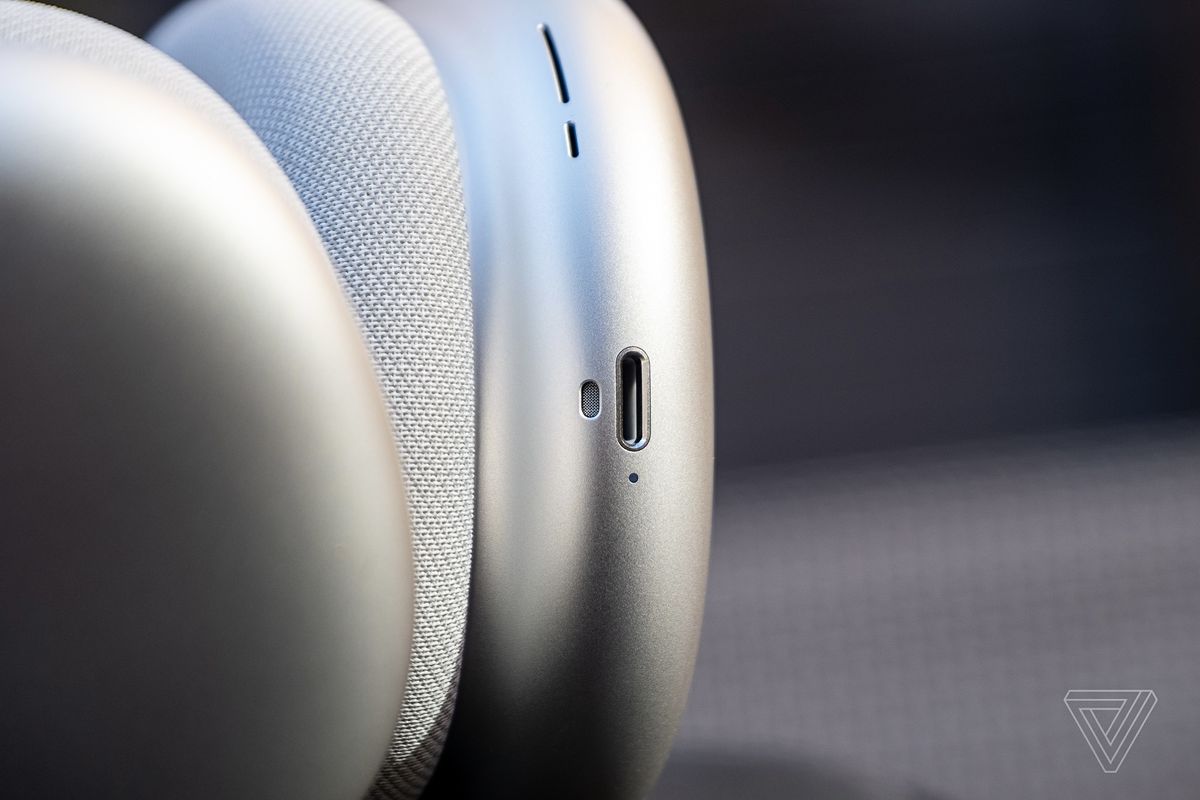
Another downside? No 3.5mm jack. The AirPods Max only have a Lightning connector, so if you want higher-quality wired audio or to plug them in on a plane, you’ve got to get a $35 cable. (No, putting an aux cord between two iPhone headphone dongles won’t work.) Ouch. I can live without the 3.5mm jack, but to not include the cable in the box? At this price?! Rude. Also, it’s worth mentioning that there’s no passive mode for the AirPods Max. When they’re out of juice, they stop working altogether — even if you’re wired. You can’t use the very good, clear-sounding voice mics on the headphones when plugged in, either. But the cable is good for eliminating all latency if you want to use the AirPods Max for recording or monitoring purposes.
Battery life is rated at 20 hours with all the features like noise cancellation turned on, which is good and more than adequate for lengthy flights, but still 10 or so hours less than Sony’s total running time. On a drained battery, charging for five minutes will get you around 90 minutes of playing time.
Now let me double back to just how much the AirPods Max weigh. The open mesh canopy does a good job of distributing their heft (even on my enormous head), and the ear cushions reduce any feeling of being weighed down. But at 385 grams, there’s no denying these are a good deal heavier than cans from Bose or Sony (254 grams). They’re not uncomfortable for me — even after a couple hours of nonstop listening — but I’m always very aware that they’re on. And it’s something to be mindful of if you’ve had any neck problems. These are definitely leisure headphones meant for the couch or sitting at your desk — and, eventually, they’ll be great travel headphones — but gym or running headphones they are not. The AirPods Max aren’t water resistant at all, but that’s true of most premium noise-canceling headphones.
The last reason to hold off on the AirPods Max right now is what I consider unrealized potential. Most people are going to be streaming Apple Music or Spotify through these things. And that means (in the case of Apple Music) you’re limited to the same compressed 256kbps AAC files we’ve been listening to for years. Apple still doesn’t offer a lossless tier, and I have to ask, if not now, when? I can plug into my iPhone with the cable and get higher quality music from Amazon Music HD or Tidal than I can from Apple itself.
On the Android side, Sony’s headphones have LDAC, a wireless codec that can wirelessly stream music at near-CD quality. Apple is falling behind here, but there’s no indication that the company cares. You can make all the arguments you want about how it doesn’t matter or that people can’t hear any difference, but when we’re talking about $550 headphones — not to mention the powerful HomePod speaker — an option to enjoy higher-quality audio should at least be there. Apple moved to 256kbps AAC all the way back in 2007 and we’ve been stuck there ever since. (“Mastered for iTunes” albums can offer improved dynamic range and subtle enhancements, but it’s no replacement for going lossless.)
Shipping estimates for the AirPods Max are already extending into March, but I hesitate to read too much into that. These headphones might end up a hit like the earbuds they share a name with, but they could also just coast by in the same vein as something like the HomePod, another Apple product that was priced higher than the competition when released (and hurt by it). If you’re the kind of person that knows you’ll love the AirPods Max, you shouldn’t hesitate to go for it. They sound killer for music and movies alike. And they feel like they should cost even more money. They’re about as luxurious as noise-canceling headphones get — but not as expensive as they come.
But there’s still no world where I recommend the AirPods Max to your average headphone shopper, especially when the AirPods Pro offer a lot of the same features for less. Many consumers will be perfectly happy sticking with the tried-and-true options from Sony, Bose, Microsoft, and elsewhere. At the very least, it’s probably worth waiting for Apple Music HD or spatial audio on the Apple TV or, for god’s sake, a better case.
Photography by Chris Welch except for lead image by Becca Farsace / The Verge

Devoted web advocate. Bacon scholar. Internet lover. Passionate twitteraholic. Unable to type with boxing gloves on. Lifelong beer fanatic.

